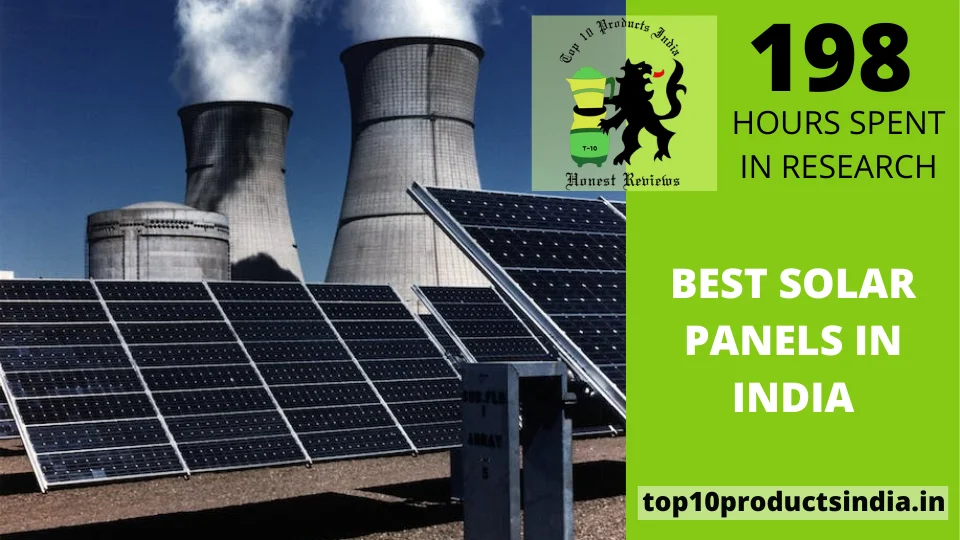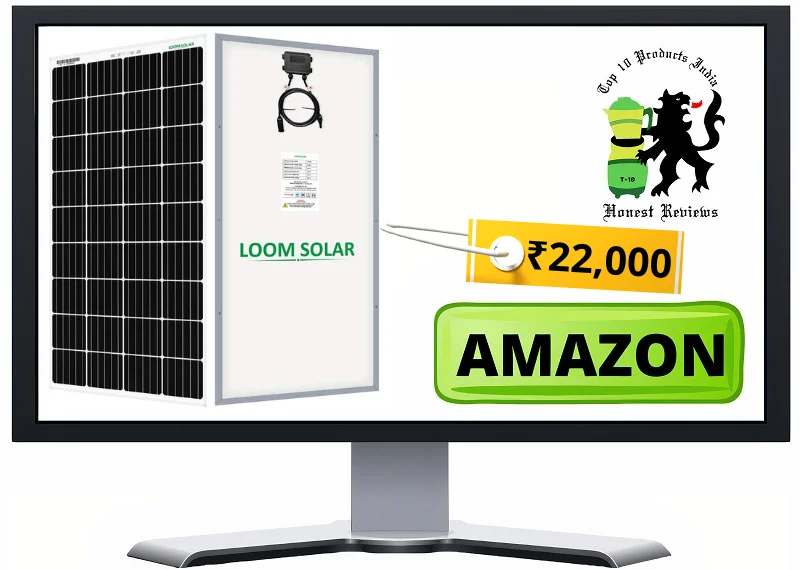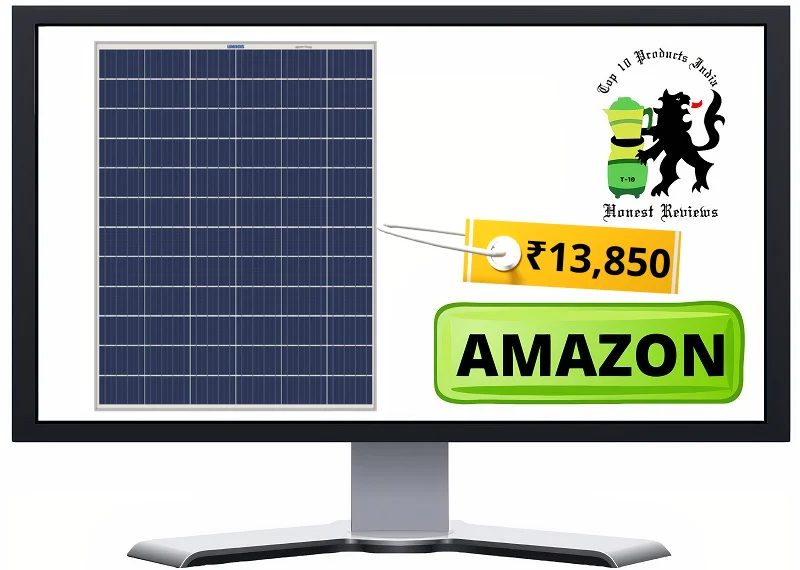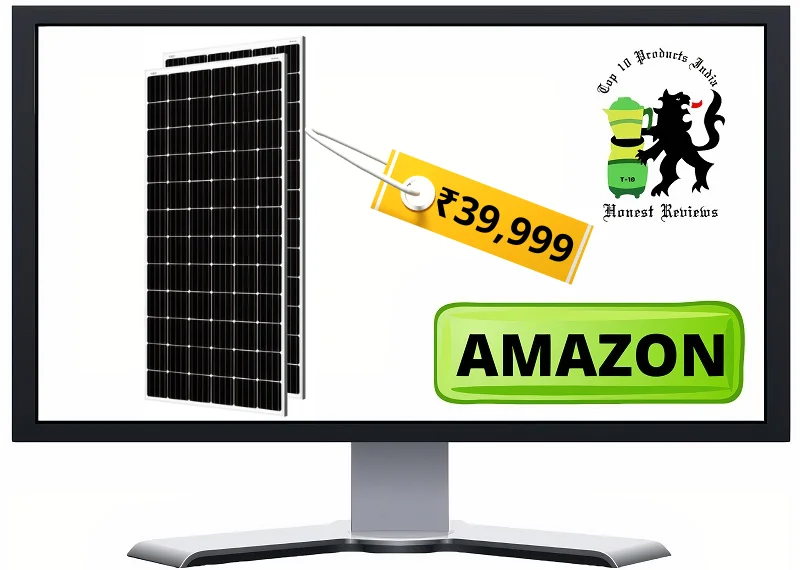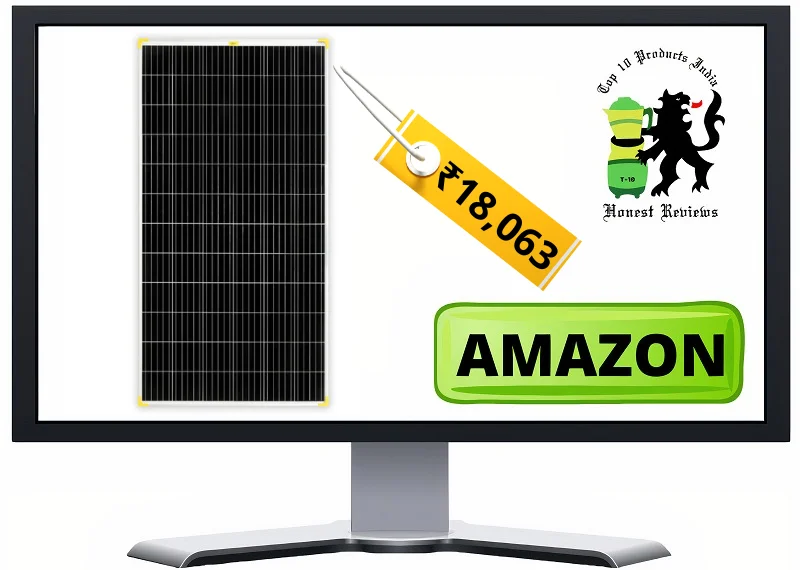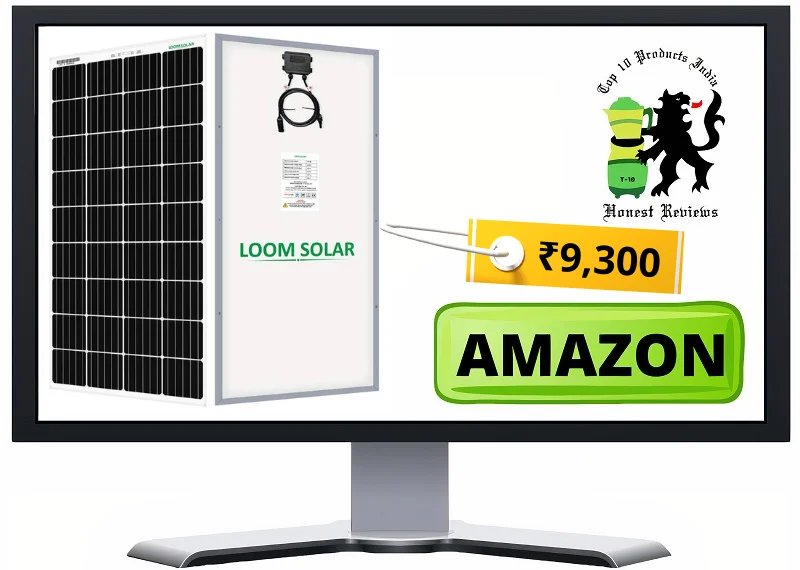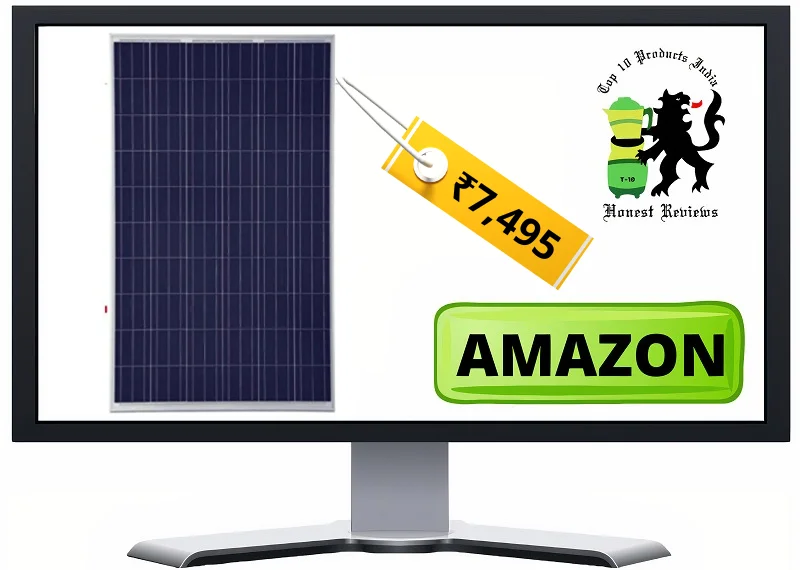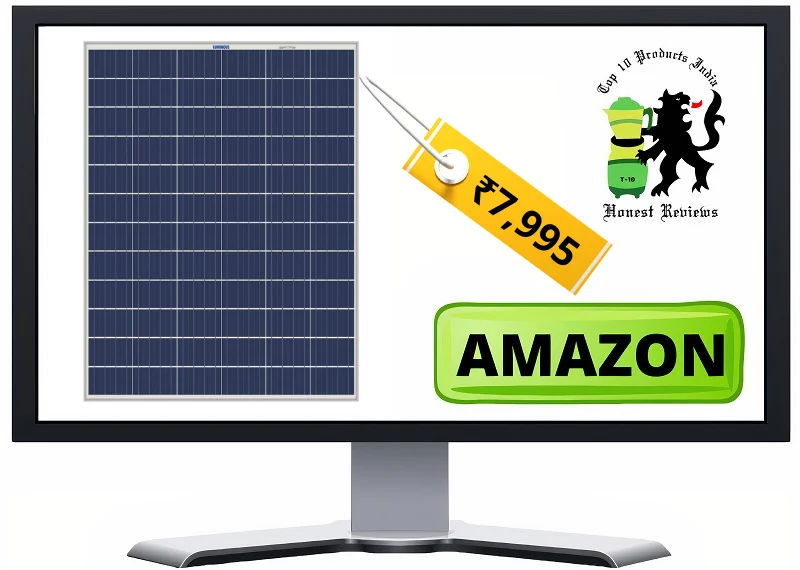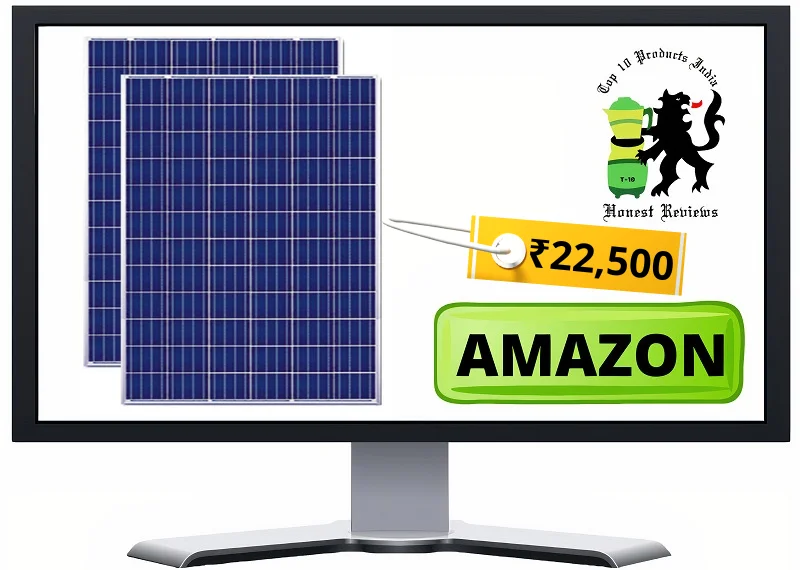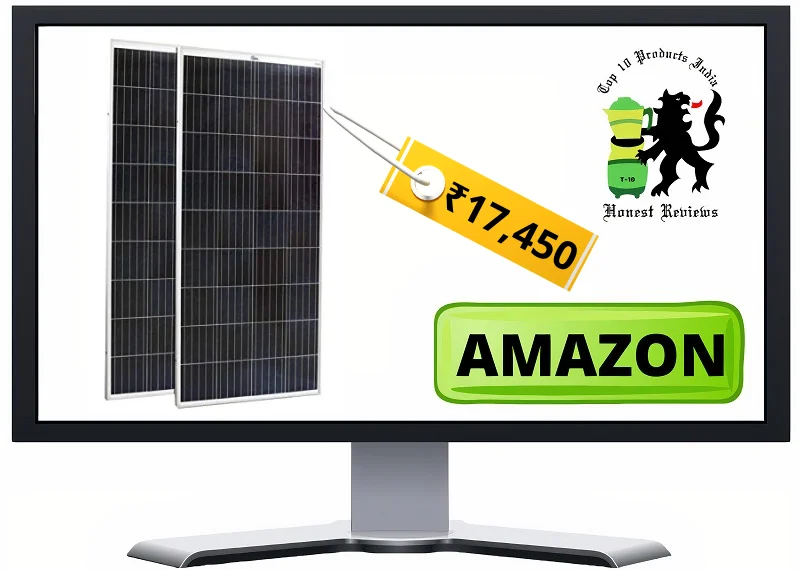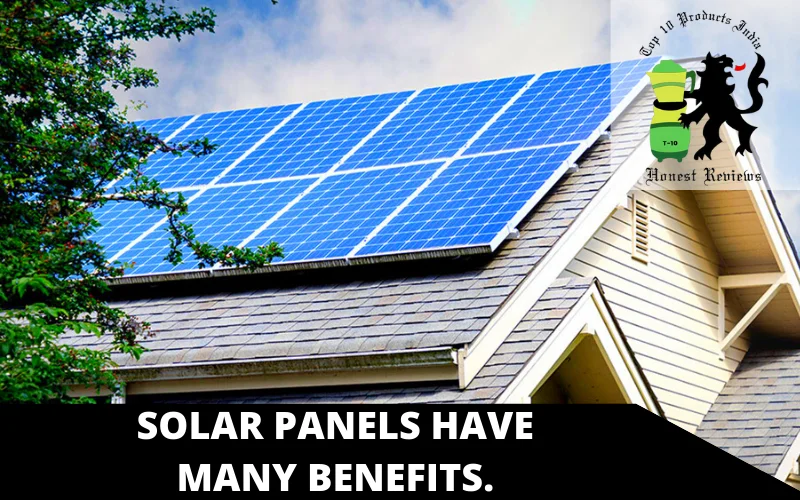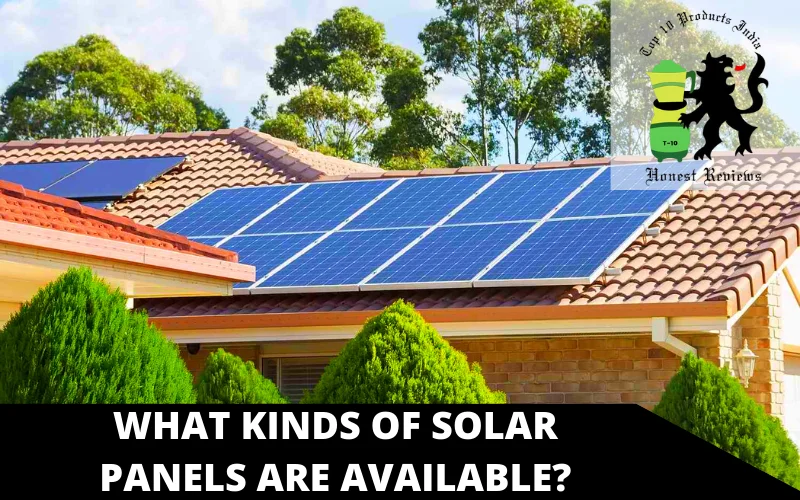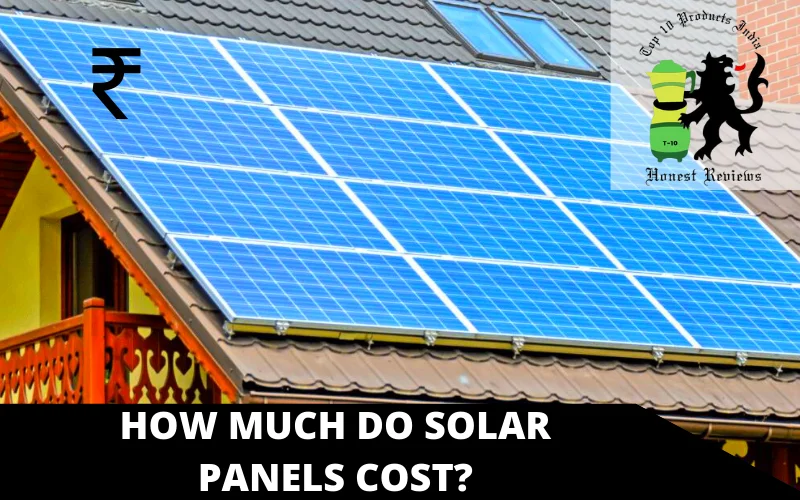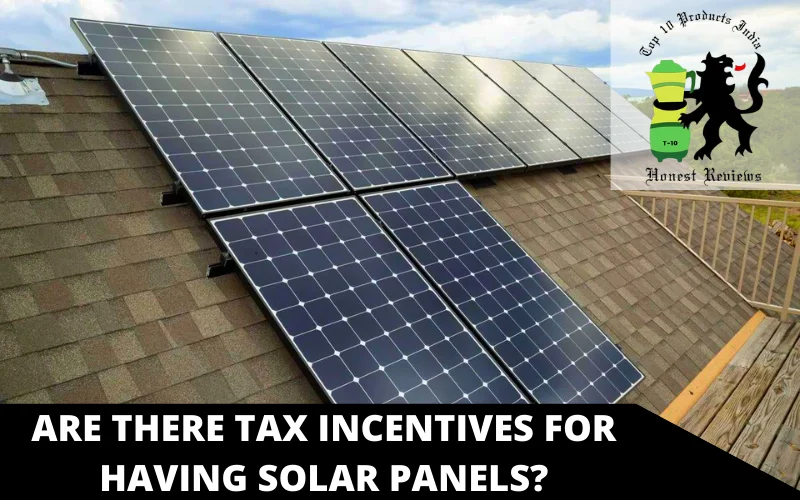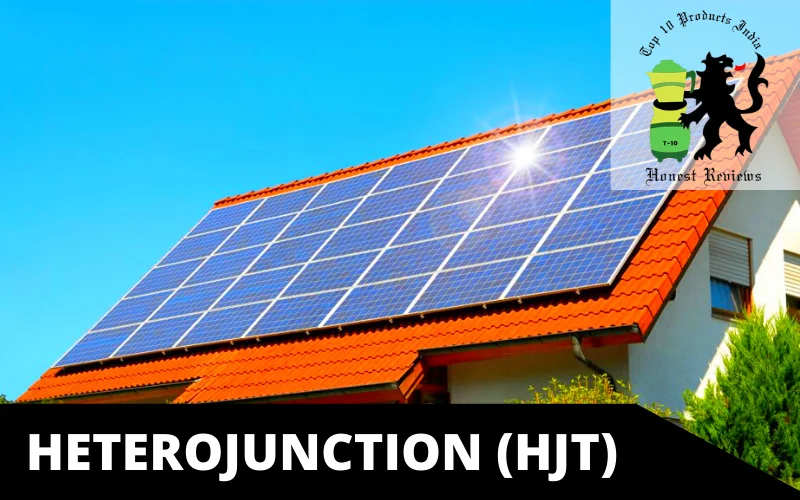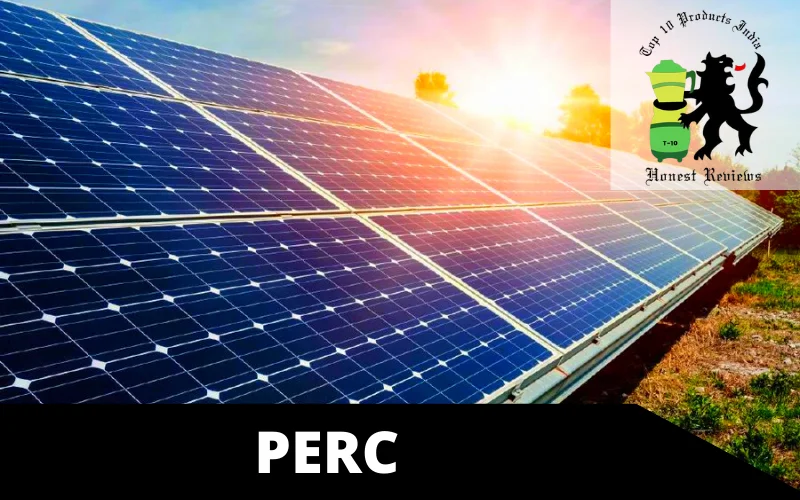India is becoming increasingly aware of the importance of clean and renewable energy sources, and one of the most attractive options to achieve this is through solar power.
Solar panels are an integral part of harnessing energy from the sun, and as such, it is important to choose the absolute best quality for your home or business.
India already has some of the world’s top solar panel manufacturers, making it easier than ever for citizens to enjoy clean energy.
Among these industry-leading producers are Vikram Solar, Waaree Solar, BYD India, Adani Solar and Tata Power, which offer high-efficiency solar panels for several residential and industrial purposes.
Investing in these panels can have a lasting impact on your energy bills over time – so browse through our top-notch list of manufacturers now to stay ahead of the curve!
Best Solar Panels from India for Home Use
1. Loom Solar 200W Solar Panel (Pack of 2) with Panel Stand
- Diodes that are pre-installed in the junction boxes
- An assortment of 40″ cables that feature MC4 connectors
- It can withstand high winds and snow loads
- Compatible with both off-grid and on-grid inverters
- A+ Grade Anti PID Mono Cells with a conversion rate of 20 per cent
- 1490x665x35 dimension
The Loom Solar 200W Solar Panel is a great way to quickly gain access to solar energy. This pack not only supports two solar panels, making installation and maintenance easy, but it also includes a sturdy panel stand for secure placement.
The stand itself is designed for long-term adaptability, allowing users to adjust each panel’s height and angle for optimum performance.
With a 25-year linear power production warranty, this set ensures you can reap solar energy’s benefits for years to come. Plus, its lightweight design makes transporting and setting up your system hassle-free.
So if you’re looking for a reliable solar energy solution that you can rely on at any time, the Loom Solar 200W Solar Panel (Pack of 2) with Stand is exactly what you need!
2. Luminous 325 Watt/24V Poly Crystalline Solar Panel
- Advanced EVA Encapsulation
- PID resistance technology that prevents power loss
- Excellent low-light performance
- Anti-reflective coating
- High-torsion resistance to winds and snow loads
- 1976x991x40 mm
- 25-year warranty
With the Luminous 325 Watt Solar Panel, you can help reduce your carbon footprint while keeping energy costs low. This panel is engineered to achieve high performance in all conditions, made from shorter-length strings of multi-crystalline cells that eliminate shading gap losses compared to typical 60-cell panels.
With its enhanced aesthetics and ultra-white glass design, it also looks great and gives you the power of reliability for years to come.
Installing this solar panel can allow you to use high-efficiency modules for grid-tie systems that offer faster payback times, greater scalability, and the highest return on investment.
3. Loom Solar Panel 375 Watt – 24 Volt Mono PERC (Pack of 2)
- Charge battery 24V
- Multiple panels can be connected in series for 24/48 V batteries or grid-tied applications.
- It is well-equipped to withstand the force of high winds and snow accumulations
- Compatible with both off-grid and on-grid inverters
- 19% cell conversion efficiency
- Junction-Box comes pre-installed and equipped with diodes. is equipped with 1M wire and the MC4 connector
- 5cm dimensions
The Loom Solar Panel 375 Watt – PERC is a great choice for those looking to reduce their energy costs and carbon footprint. This long-lasting and durable solar panel offers environment-friendly energy production without sacrificing performance.
Featuring Monocrystalline PERC technology, it exudes higher efficiency than a conventional solar cell. The panel is designed for outdoor use even in bad weather conditions, ensuring sudden weather changes won’t catch you off guard.
Plus, it also comes with an assurance of 10 years performance warranty, enabling you to reap the benefits of the solar panel for many years to come. A wise investment all around, this powerful yet lightweight product is sure to meet all your energy needs.
4. Galo Energy Solar Panel 400 W with 24 V and 72 Cell MonoCrystalline
- 400W mono solar panel
- Automatic Tabber & Stringer Process
- Mono Cells of the highest quality with positive tolerances of 3W or more.
- No negative tolerances for committed power
- Anti-reflection glass-coating
- Mono Crystalline panel with the latest cell technology that creates the highest energy from sunlight
- 5 years of warranty on manufacturing defects
With the Galo Energy Solar Panel , customers can rest assured they’re receiving premium performance with 24 V and 72 Cell MonoCrystalline.
Boasting efficiency ratings that often surpass their competitors, the panel is perfect for any customer aiming to reduce their reliance on traditional energy sources and instead power their home with a reliable and cost-effective solar system.
Its construction also ensures a long lifespan and effective weather protection, making it both an economical and convenient energy source for anyone looking to make a positive lifestyle change.
5. Loom Solar 180W – 12V Mono Crystalline Panel
- 12V battery charging, or multiple wired panels to charge batteries 24/48V or grid-tied applications.
- The diodes are pre-installed into the junction boxes and two 40″ cables that have connectors for MC4
- Stands up to high winds and snow loads
- Compatible with both off-grid and on-grid inverters
- Open circuit voltage 23.26V and optimum operating current (Imp) 9.03Amps, short-circuit current (Isc) 9.31 Amps
- High module conversion efficiency based on the availability of sunlight
Loom Solar 180W – 12V Mono Crystalline Panel is a highly efficient solar panel that can help you save money and energy. It is designed to deliver excellent power output even in low light conditions, making it ideal for sustainable off-grid energy solutions.
Its corrosion-resistant frame ensures durability, while its exceptionally low-temperature coefficient adds to its high efficiency. The advanced multi-busbar technology helps reduce wiring losses and further improves the module’s performance.
Integration of this panel into existing systems is fast and straightforward, and it is one of the best options for anyone looking for an efficient, cost-effective solar power solution.
6. Microtek Solar Panel MTK 150W 12V
- Positive power-tolerance modules
- High conversion efficiency
- Anti-reflective coating glass
- Maximum power 150W/12V Open circuit voltage 22.05V with short circuit voltage 8.81A
- Multi Crystalline Silicon solar cell type
- Anodized frame
- The glass is made from low iron.
- 1495x665x35 mm dimension
The Microtek Solar Panel MTK is designed to maximise your money’s efficiency. Its efficient design ensures that a small section of this purpose-built solar panel can easily generate up to 150 watts of energy, making it an ideal choice for powering large devices or systems with limited space.
With its powerful yet convenient portability and advanced technology that makes it resistant to overheating, the MTK 150W is an exceptional value for solar energy systems.
Perfect for those who want hassle-free high-power generation in residential and commercial environments, the Microtek Solar Panel MTK 150W 12V helps make your life greener and brighter.
7. Luminous 160W – 12V Poly Crystalline Solar Panel for Home
- 160W, 12 V PolyCrystalline Solar Panel
- 12V operating voltage
- 25 years of warranty
- Output power: 160W
- Outstanding low-light performance
- Anti-reflective coating with high torsion resistance against snow and winds loads
- 8 feet wide x 2.1 feet
Environmentally conscious shoppers will love the Luminous 160W – Solar Panel for Home. This powerful solar panel provides an affordable and efficient option to power your home through renewable energy.
With its sleek design and durability, this product is perfect for any residential application. Not only does it decrease our reliance on traditional electricity sources, but it also provides long-term savings due to its reduced ongoing costs. Investing in solar is a wise decision.
With the Luminous 160W – 12V Poly Crystalline Solar Panel for Home, you have a quality solution that will help you take the next step in powering your home’s sustainable future.
8. AWCRE – 200W, 12V Polycrystalline Solar Panel – Pack of 2
- AWCRE 200W
- Open circuit voltages as high as 22.3V as well as Current Isc of up 11.75A (generates two units)
- Protective diode built-in to protect against an accidental reverse connection
- 25-year warranty
- Solar charge controller 12V30A that can be used for two panels
Get ready to take your solar energy projects to the next level by picking up this AWCRE – 200W, 12V Polycrystalline Solar Panel – Pack of 2!
For all your off-grid nomad adventures, this sturdy pack of two solar panels is the perfect way to ensure you don’t miss the sun even when you’re miles away from home.
This set of two high-efficiency 12V solar panels comes with easy-to-install mounting accessories and a water/weather-resistant junction box for safety.
With quick and easy assembly, you’ll be able to move power into your home or cabin quickly, so no matter how big or small your project is, you can get it done in less time than ever before.
9. Galo Energy BIS Certified Solar Panel 160W (Pack of 2)
- 160W, 12V 36 cells BIS certified solar panels
- Panels are manufactured using an automated Tabber & Stringer process
- High-efficiency cells with positive tolerances that can reach 5W. No negative tolerances for the dedicated power levels
- Anti-reflective, high-transmission glass coating
- PID is not required
- Anodized frame
- Perfect for lighting, charging batteries, or off-grid lighting applications
- 5-year guarantee on manufacturing defects
With the ever-increasing focus on renewable energy sources, solar power is certainly a smart choice. Galo Energy’s Solar Panel offers an efficient and reliable way to harness energy from the sun.
Constructed using only the highest quality materials, this panel provides high efficiency at optimal temperatures. It is also designed to withstand extreme weather conditions such as rain, dryness, hail, and heavy snow loads without any issue.
Moreover, its excellent performance at low illumination levels ensures reliability even at night or during cloudy days when other power sources fail.
Proudly made in India by one of the leading manufacturers of solar panels worldwide, the Galo Energy BIS Certified Solar Panel 160 W presents an ideal solution for those looking to go green with their daily energy needs.
How do solar panels work?
Solar panels are a relatively new technology that has the potential to power our future. These panels directly absorb sunlight, converting it into energy that can provide electricity for homes and businesses.
To do this efficiently, solar panels are made up of many cells composed of specially treated semiconducting materials such as silicon. When sunlight hits these cells, the material’s electrons become negatively and positively charged and create an electrical current.
This current can then be directed into wires, which can then be connected to either home-based or grid-supply power systems to provide the necessary electricity.
Solar panel technology is evolving rapidly and becoming more efficient each year; with governments globally pushing for renewable energy sources, this technology looks set to shape the way we use energy for years to come.
Solar panels have many benefits
What are the reasons you should consider solar panels for your home? Solar panels for homes offer many advantages:
- Reduce electricity bills: Solar panels generate electricity from the sun, which can help to reduce or even eliminate your reliance on electricity from the grid.
- Lower carbon footprint: Solar energy is a clean, renewable resource that doesn’t produce carbon emissions, which helps to reduce your overall carbon footprint.
- Increase property value: Having solar panels installed on your property can increase its value, as they can be seen as an attractive feature for buyers or renters.
- Low maintenance: Once installed, solar panels require very little maintenance and should last for many years, with only occasional cleaning and check-ups.
- Government incentives: Many countries offer rebates, tax credits and other incentives for homeowners and businesses that install solar panels.
- Energy independence: Solar energy can provide a way for you to generate your own electricity and be less dependent on the power grid.
- Environmentally friendly: Solar energy is a clean, renewable energy source that doesn’t produce pollutants and is a sustainable way of generating electricity.
Things to Consider Before Purchasing Solar Panels
1. What kinds of solar panels are available?
When considering what type of solar panel to buy, several options exist. Monocrystalline panels are the most efficient but also carry a higher cost.
Polycrystalline panels are less efficient and more affordable, making them a popular choice for many. Thin-film panels are even cheaper than polycrystalline but also less efficient.
Hybrid panels use a combination of monocrystalline and polycrystalline cells for improved but still more affordable efficiency and cost savings.
Before deciding what kind of solar panel to purchase, it’s important to consider your budget, space availability, and the expected lifetime of the panel.
With so many options available on the market today, finding the one that best meets your needs can seem daunting, but there’s something for everyone out there.
2. Do you require permission to put up solar panels?
In most cases, homeowners do not need to obtain special permission to install solar panels on their property. However, certain restrictions or regulations may vary depending on the location and jurisdiction.
For example, some local governments may have zoning laws restricting the size or placement of solar panels on a property. Additionally, homeowners associations may have their own rules and regulations regarding solar panel installation.
It is always best to check with your local government and any homeowner association you may be a member of to ensure compliance with any regulations or restrictions.
Furthermore, some state or federal incentive programs may require specific documentation or participation approvals.
In summary, while there is no general requirement for permission to put up solar panels, it’s important to check with your local government and any homeowner association you may be a member of to ensure compliance with any regulations or restrictions.
3. How much do solar panels cost?
The cost of solar panels can vary depending on several factors, such as the type of solar panel, the quantity, the location, the company you choose, and the size of your solar system.
On average, the cost of a solar panel system in India can range from INR 10,000 to INR 40,000 for a residential property, with the national average cost being around INR 50,000.
The cost per watt can range from INR 35 to INR 45. Keep in mind that solar panel system costs also depend on the local, state and federal incentives and tax credits that you may be eligible for, which can help offset the system’s cost.
Additionally, many solar panel companies offer financing options to help make the initial cost more manageable. The cost of solar panels in India has decreased over the years due to the increase in solar panel manufacturing units and the government’s push towards renewable energy.
4. Are your roofs ready to receive solar panels?
Having the right roofing requirements for solar panels is key to having a successful installation. If you’ve been considering adding solar panels to your home, it’s important to assess your roof’s condition.
Age and type of material are two essential components that should be considered when determining if your roofs are ready to receive this renewable energy source.
Generally speaking, an aged or worn-out roof may need additional repairs or replacement before a solar panel system can be installed safely and properly.
Older asphalt shingle roofs may need additional upgrades, like heat-dissipating ventilation, to ensure the system’s longevity. If done right, however, putting solar panels on a roof will save energy over time.
5. Do we need an extra backup battery for the solar panel?
A backup battery is not always necessary when using solar panels, but it can be useful in certain situations. For example, if you live in an area with frequent power outages or if you want to ensure a continuous power supply during times when the sun is not shining, a backup battery can provide peace of mind.
Additionally, suppose you want to use your solar power during a power outage. In that case, a battery backup can be used to store the energy generated during the day to be used at night.
However, it is important to note that the cost of a backup battery can be high and may not be necessary for all solar panel systems. It’s best to consult with a solar panel professional to determine if a backup battery is a right choice for your specific needs.
6. Should you buy the solar panel or lease it?
Deciding to buy or lease a solar panel is largely up to the individual and depends on their finances. If you buy, you may have to put a larger initial investment into it, but it could save you long-term costs because of no expenses for maintenance and ownership of the equipment.
Leasing may be beneficial for those who want an easier means of keeping up with the equipment since an account will be set up for monthly payments, but then there would be a potential increase in cost.
Ultimately it comes down to what an individual believes is best for them when weighing out their financial options, as either option can offer strategies that reduce overhead costs.
7. Are there tax incentives for having solar panels?
Yes, there are various tax incentives for having solar panels, which can help offset the installation cost. In the United States, for example, homeowners who install solar panels may be eligible for the federal Investment Tax Credit (ITC), which allows for a credit of 26% of the cost of a solar panel system to be applied to the homeowner’s federal tax liability.
Additionally, many states offer their own tax incentives, such as rebates, grants, or property tax exemptions. It’s always best to check with your local government and consult with a tax professional to see if you qualify for any tax incentives.
Types of Solar Panels
You’ll find the primary kinds of solar panels in your home are multicrystalline and monocrystalline (aka polycrystalline). However, there are many other kinds too. Here’s a quick overview of the current primary solar panel models available on the market.
Mono and Monocrystalline
Solar energy is a clean, renewable energy source that has the potential to reduce our dependence on the burning of fossil fuels. One of the most popular ways to harness solar power is to use photovoltaic (PV) panels – like mono and monocrystalline.
Monocrystalline PV panels comprise many silicon crystals, while mono panels comprise only one crystal. Both types of PV cells have their advantages, such as durability, lightweight construction, and energy efficiency.
Monocrystalline cells are slightly more efficient than mono cells in conversion rates. However, they can also be expensive due to the number of raw materials needed for their production process.
Mono cells offer an affordable option that still provides reliable performance in most conditions. Solar panel technology continues to evolve rapidly, allowing us to access clean energy with increasing ease and flexibility.
Heterojunction (HJT)
Heterojunction (HJT) solar panels are rapidly gaining popularity as a reliable, efficient and long-lasting energy source. Compared to traditional solar cells that use a single layer of photovoltaic materials, HJT solar panels employ several layers, combining crystalline and thin-film technologies.
This compound structure allows for superior voltage and current stability, performance in low light conditions, improved temperature tolerance and greater efficiency than other types of photovoltaic cells.
With a higher power yield per module and block, HJT solar panels are perfectly suited for small residential and commercial projects.
Thanks to their excellent energy production capabilities and reliability over time, HJT solar panels represent the ideal choice for those looking for an efficient renewable energy source.
Interdigitated solar cells with back contact (IBC)
Utilizing interdigitated solar cells with back contact, or IBC is a revolutionary advancement in the realm of solar energy. This technology involves arranging multiple thin-film photovoltaic cells on a solid substrate and wiring them together on one side to create an integrated structure.
This arrangement allows IBC solar panels to be lighter, more efficient and able to withstand higher temperatures than traditional photovoltaic cells without sacrificing power output, making them ideal for use in hotter climates where other panel types may begin to deteriorate.
The ability to construct the panels from inexpensive materials such as copper and gallium arsenide also makes them comparable in cost to alternatives while giving them added durability and ease of installation.
DC or AC
With the rising energy cost, many people are turning towards solar power to help them save money in the long term. Because there are a variety of solar panels available on the market, knowing which type is right for you is important.
Solar panels can be split into two main categories: DC and AC. DC (direct current) panels require an inverter to convert the direct current into an alternating current that household appliances and outlets can use.
They also tend to be much lighter than AC (alternating current) panels, making them easier to install and install in tight spaces.
AC panels come ready to plug straight into existing outlets, but they are generally larger and heavier than DC panels. Ultimately, it’s up to your individual needs and preferences when deciding between these two types of solar panel designs.
PERC
PERC (Passivated Emitter Rear Cell) solar panels have gained recognition in the field of renewable energy due to their impressive power production capabilities.
These cutting-edge panels are made up of back-contact cells that provide increased efficiencies. They feature a patented passivated emitter rear contact (PERC) design which increases the diffusion of light on the cell surface.
While more expensive than traditional monocrystalline and polycrystalline panels, PERC allows solar panel owners to produce more sunlight per area by capturing reflection from dust, grime, and debris.
Consequently, it enables solar panel owners to generate more electricity for less money. Additionally, PERC technology is a great choice for regions with weak sunshine as its improved light absorption technology helps capture low-angle sun rays making electricity production easier in these climates.
Conclusion
Solar panel technology in India has grown dramatically in recent years, thus making it easier for people to access and utilize sustainable energy sources.
With several manufacturers providing solar panels on the Indian market, people have a wide selection to choose from that fits their individual needs and budget.
However, research has shown that some brands stand ahead of the crowd regarding quality and performance, making them the best solar panel options in India.
This includes brands like Solaria, Trina Solar, Tata Solar Panel, Waaree Energies Pvt. Ltd., Adani Solar Pvt. Ltd., Vikram Solar Pvt. Ltd., and many more.
Those who wish to install solar panels to switch to clean energy sources should do their due diligence and invest in good quality products for reliable performance over time.

